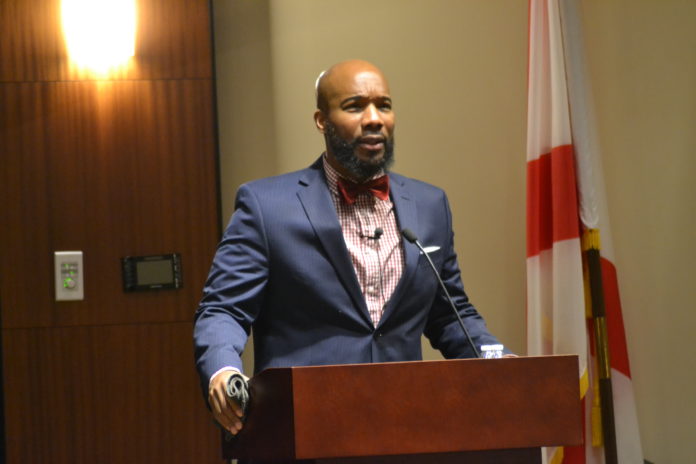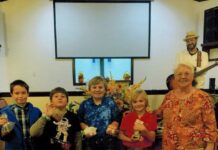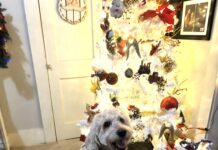
HANCEVILLE, Ala. – Wallace State Community College (WSCC) welcomed motivational speaker, storyteller and vocalist David Anthony Johnson Wednesday as part of the college’s Black History Month observances.
WSCC said in a media release prior to the event, “Johnson is best known for his reenactments of the speeches of Dr. Martin Luther King, Jr., emulating the reverend’s vocal style. He has performed for and shared the stage with Civil Rights activists such as the late Rosa Parks, Johnnie Cochran, Maya Angelou and more. He also specializes in telling stories about the Underground Railroad and the Civil Rights Movements.”
WSCC Dean Students Dr. Ryan Smith introduced Johnson Wednesday morning.
“Mr. David Anthony Johnson has been a professional motivational speaker, inspirational solo artist, Dr. Martin Luther King, Jr. impressionist, historical storyteller, songwriter, inventor and youth motivator for more than 30 years,” he said. “He uses his talents to inspire others to use their talents positively to make a difference in our communities.”
Smith continued, “David was raised by his great-grandmother, mother and aunt to realize that God had given him special gifts and talents. They also instilled in him the importance of honoring God with those gifts and talents by helping others to realize their gifts and talents. David uses his great-grandmother as his biggest inspiration. She was the daughter of a Tennessee slave and taught David the importance of loving his brothers and sisters of all races and all walks of life.”
Johnson indeed focused on his great-grandmother, whom he lovingly referred to as “Mama.”
He said Mama told him, “When an old person dies, a library dies. So, you make sure you get as much information from an old person as you can. Because when they’re gone, they’re gone.”
Johnson said he would sit with his great-grandmother as a child and listen to her stories, and she’d constantly remind him, “I want you to share everything I’m telling you, because one day I’ll be dead and gone.”
He shared a story about Mama saying to him one day, “David, did you know there were three Moseses?”
He said he was confused, but he correctly guessed the first Moses was the Moses that helped the Israelites out of Egypt. Pleased, his great-grandmother told him she’d sing some songs to introduce the second Moses.
He said she sang him traditional “negro spirituals,” breaking down the lyrics, showing him how some lyrics were really code revealing directions for slaves to reach the Ohio River. She told him it was a masterful plan, with the addition of slave seamstresses creating quilts that were actually maps of the plantations with further direction to reach the Mason-Dixon Line, which, together with the Ohio River, at that time was considered the dividing line between the free states of the North and the slave states of the South. Once escaped slaves reached the Ohio River, they would meet the second Moses, Harriett Tubman, who led them to freedom on the Underground Railroad.
“These songs conveyed trouble, pain, hope, faith, love and also were used as songs for codes for escape,” she told Johnson. “I sang those songs for a reason because in them were codes for escape!”
So who was the third Moses?
Johnson said when he was 5 years old, he remembers seeing a man’s face plastered everywhere. He thought the man was following him. When he saw the man’s face on an album his great-grandmother treasured, Johnson asked her who it was.
He said she responded, “This is the third Moses, Dr. Martin Luther King, Jr.”
Johnson said Mama told him Dr. King was the third Moses because he tried to make people of all colors free and fought for civil rights.
He said she wanted him to learn all Dr. King’s speeches. As he grew older, he said, he continued learning the speeches, working on his voice to emulate King’s vocal resonance.
Learning about King’s death had a profound impact on Johnson.
“My great-aunt gave me a newspaper with an obituary in it, and on that obituary it said April 9, 1968, and it had Martin Luther King’s face on it and she said, ‘David, nine years ago I drove down from St. Louis to attend Martin Luther King’s funeral, and do you know he preached his own eulogy?’” he said. “I thought maybe she forgot that when you die, you can’t sing, talk or make people laugh; you can’t do anything! You especially can’t speak at your own funeral! So, I thought she must be in great error. I went to the Junior Davis Branch Library; I went in there and went to this section and read and I went, ‘Ah-ha, she is right!’”
He continued, “Ten years later, while a student at Oakwood University, I was asked to speak at the Ebenezer Baptist Church; I was there to meet Coretta Scott King, but our school bus was late. We missed her! She waited too long and was going to miss her plane and I did not get to meet her. I was an hour late. But while I was there, I ran into two ladies that were there (when King preached) on this particular day- it was Feb. 4, 1968. They invited me, they took me into the sanctuary and said, ‘There our pastor stood right there.’ He got up that morning and preached a beautiful sermon called ‘The Drum Major Instinct.’ And in that sermon, he talked about how everyone ascribes greatness by being first, but he tried to reorder the whole priority by saying true greatness comes by serving. True service comes by loving your brother and helping him, even into death. That’s true greatness. The ladies said, ‘Child at the end of his sermon, he started talking about his own death!’ And when he died, 60 days later, when he was assassinated, five days after that night of April, at his funeral, they played what he said two months earlier. And that last part of ‘The Drum Major Instinct,’ they titled, ‘The Eulogy,’ what he wanted said when he died. And they recorded it and played it at his funeral, thus determining that it’s true: he preached his own eulogy.”
Johnson recited the eulogy for the audience.
Watch The Tribune’s livestream of Johnson’s presentation at www.Facebook.com/CullmanTribune/videos/278950783074093/.
Copyright 2020 Humble Roots, LLC. All Rights Reserved.




















